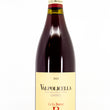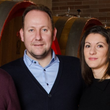

Cà la Bionda - Valpolicella Blend - Valpolicella Classico, Veneto, IT - 2023
Regular price $29.00
Unit price per
Notes from the Winery/Importer
GRAPE VARIETIES 70% Corvina, 20% Corvinone, 10% Rondinella and Molinara.
REGION OF ORIGIN
The historically “classic” zone of the Valpolicella.
SOIL
The soil is a mix of mainly clay limestone rich in calcium with a significant presence of stone and rock material. This type of soil gives the wines great freshness and elegance, essential characteristics for long-lived wines.
VINEYARDS
The vineyards are located in a hilly position, at a variable altitude ranging
from 150 to 300 meters above sea level, with East, South-East exposure.
HARVEST
Harvest generally begins during the last ten days of August and
continues through to the end of September.
FERMENTATION AND AGEING
The grapes for this Valpolicella are fresh. The exceptional soil type and the hillside position of this vineyard provide the necessary qualities to produce a red wine of great prestige. All of the best fruit from this vineyard goes into this Valpolicella rather than being selected for our Amarone. The wine ages in 3000 litre oak casks for 18 months following fermentation.
TASTING NOTES
A wine of extraordinary finesse and elegance. Spice notes, forest fruits and hints of rose petal characterise the nose. The palate is fresh and complex.
Notes on the Producer
The Azienda Agricola Cà la Bionda is situated in the commune of Marano di Valpolicella, in the heart of the historically “classic” zone of the Valpolicella. The winery was founded in 1902 by Pietro Castellani (namesake of the current owner) and is now run by the fourth generation of the family represented by brothers Alessandro, the winemaker, and Nicola, the viticulturalist. The vineyard area extends over 29 hectares of hillside land at an altitude ranging from 150 to 300 meters above sea level and with an east south-east exposure.
Our wines are faithful expressions of our land and of the Marano valley. We only work with native grapes and we only use traditional winemaking processes.
The winery has been certified organic since 2016 and in 2008, along with other like-minded producers, contributed to the formation of the FIVI association: Federazione Italiana Vignaioli Indipendenti.
The FIVI represents a growing group of vignerons who personally follow the entire wine-making process: they grow their own grapes, vinify their own grapes, bottle their own wine and market their own wine.
C’a la Bionda has been practicing organic viticulture and wine-making since the year 2000. The process of obtaining official certification began in 2012.
The 2016 vintage is the winery’s first with official organic certification. Official certification is important in that it ensures rigorous controls which provide a guarantee to the consumer.
In organic viticulture the use of chemical and synthesised pesticides, herbicides, insecticides and fertilizers is prohibited. We have been using the technique of “sexual confusion” in our vineyards for many years now. This is a useful technique in protecting the vineyard from parasites such as caterpillars, grape worms and butterflies, it also eliminates the need to use environmentally damaging insecticides. The technique involves releasing female insect pheromones which divert the male insect from the female and therefore drastically reducing the possibility of larvae being born.
In our biodiversity project we grow native-breed sheep “Brogna of Lessinia mountain” to keep the vines clean from the weeds and by the way to fertilize the soil naturally.
We cultivate cover, secondary, crops between vine rows in our vineyards which we then plough back into the vineyard soil. This provides the soil with nitrogen, carbon and other micro elements which contribute to vine health and ultimately better quality grapes.
To remain faithful to our organic and environmentally sustainable approach to viticulture we only use wild yeasts in our ferments and use minimal Sulphur Dioxide, no more than a quarter of what is permitted in conventional wine-making. The grapes harvested from vine rows bordering vineyards that are not ours are sold off in order to be sure that any contamination from sprays used by our neighbours will not pollute our own grapes.
The real meaning or significance of organic viticulture and wine-making is to accept the adversities that nature brings , our task is to deal with these adversities in a natural, and not chemical, way. Ultimately, this creates the intimate bond with nature that enables us to cultivate rather than to exploit, the only means we have of faithfully transforming nature’s excellence into an equally excellent glass of wine.
Organic means not only to respect the natural world around us but also the people, families and communities who are part of this natural world and who populate our agricultural lands.


